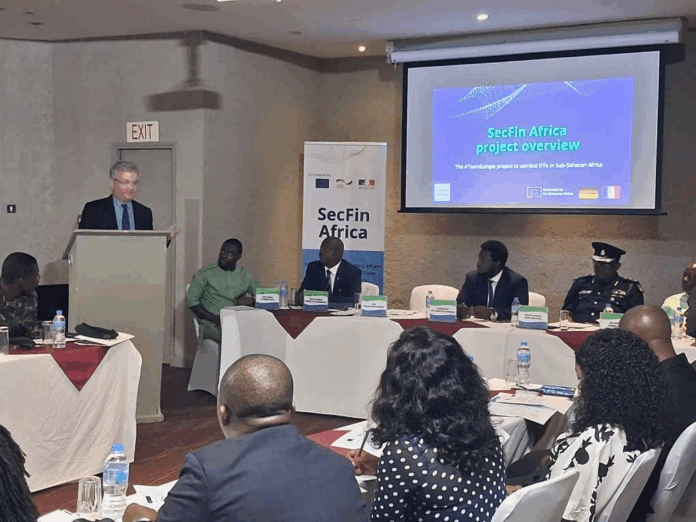By SKS
The European Union (EU) Delegation to Sierra Leone on Monday 16th of June 2025, officially launched a two-week intensive training program focused on anti-money laundering (AML) and countering the financing of terrorism (CFT), emphasizing the importance of robust financial crime investigations in safeguarding development and regional stability.
Delivering the opening address, Emilio Rossetti, Deputy Head of the EU Delegation in Sierra Leone, underscored the destructive impact illicit financial flows have on national development. “Illicit financial flows are corrosive forces that drain national budgets, fuel corruption and insecurity, and deprive your people of the basic conditions for a dignified life,” Rossetti stated.
He highlighted that behind these flows lie grave crimes, including corruption, drug trafficking, illegal trade, terrorism financing, and tax evasion, that undermine Sierra Leone’s progress.
Rossetti pointed out the staggering scale of illicit financial losses across Africa, estimated at approximately 89 billion US dollars annually, nearly equivalent to combined official development assistance and foreign direct investment. “That money could build schools, hospitals, roads, and bridges, these are stolen opportunities that delay much-needed development,” he added.
The EU official emphasized that criminal networks exploit weak systems to move and conceal illicit funds with impunity, reinforcing the need for strong AML/CFT frameworks. “Robust anti-money laundering and countering the financing of terrorism frameworks are essential,” he said, referencing ongoing support to strengthen Sierra Leone’s institutions and promote inter-agency coordination.
Despite notable progress, including recent legislation such as the 2024 Anti-Money Laundering Act and the establishment of the Financial Intelligence Agency as an autonomous body, significant vulnerabilities remain. Rossetti highlighted issues like Sierra Leone’s large informal economy, porous borders, and weak cash controls, which are exploited by criminal enterprises involved in drug trafficking, smuggling, and fraud.
He stressed the importance of implementing existing laws effectively, increasing the use of financial intelligence, and reinforcing supervision of high-risk sectors such as foreign exchange bureaus, casinos, real estate, and gold dealers. “It’s not enough to require these entities to assess risks; we need to ensure they report suspicious transactions and that law enforcement agencies utilize this intelligence,” he said.
Regional cooperation remains a key pillar of the fight against transnational crime. Sierra Leone is under the scrutiny of the Inter-Governmental Action Group against Money Laundering in West Africa (GIABA), which continues to provide guidance and assess progress.
The upcoming 2025 follow-up report and the 2027 mutual evaluation will be critical benchmarks requiring sustained political will and multi-sectoral collaboration.
Rossetti reaffirmed the EU’s commitment to fostering international cooperation and leveraging technology for effective crime tracking. “Trafficking and money laundering are transnational crimes that require coordinated, cross-border responses,” he noted. The EU aims to create operational bridges between African and European agencies, promoting intelligence sharing and joint investigations.
He highlighted several regional initiatives supported by the EU, including the development of police databases, port monitoring systems, multi-agency capabilities, and cross-border security cooperation through regional organizations like ECOWAS.
The training program is part of the EU’s broader support framework, notably through the SecFin Africa initiative, which is jointly financed with Germany and France. This project aims to strengthen Sierra Leone’s Financial Intelligence Agency, facilitate its accession to the Egmont Group—enhancing international information exchange—and improve inter-agency cooperation across the AML/CFT chain.
Rossetti concluded by emphasizing that this training marks the official launch of SecFin activities in Sierra Leone. It is designed to equip investigators, analysts, and trainers with the practical tools needed to detect and disrupt financial crimes, thereby safeguarding the country’s future.
“The fight against financial crime is vital to achieving Sustainable Development Goal 16, peace, justice, and strong institutions,” he remarked. “Together, we can build a more secure and prosperous Sierra Leone, where opportunities are not stolen but shared by all.”


